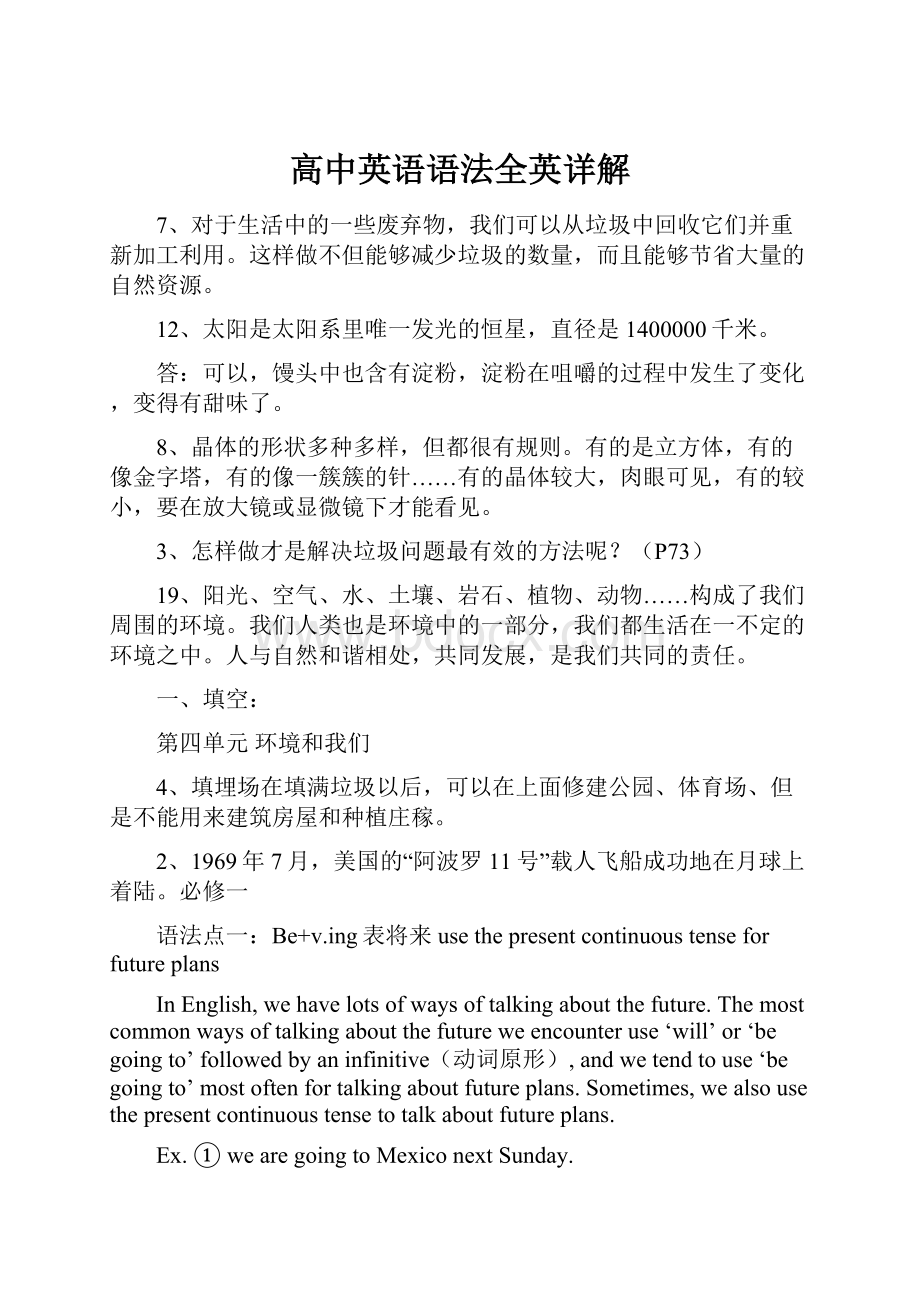高中英语语法全英详解Word下载.docx
《高中英语语法全英详解Word下载.docx》由会员分享,可在线阅读,更多相关《高中英语语法全英详解Word下载.docx(33页珍藏版)》请在冰豆网上搜索。

2、1969年7月,美国的“阿波罗11号”载人飞船成功地在月球上着陆。
必修一
语法点一:
Be+v.ing表将来usethepresentcontinuoustenseforfutureplans
InEnglish,wehavelotsofwaysoftalkingaboutthefuture.Themostcommonwaysoftalkingaboutthefutureweencounteruse‘will’or‘begoingto’followedbyaninfinitive(动词原形),andwetendtouse‘begoingto’mostoftenfortalkingaboutfutureplans.Sometimes,wealsousethepresentcontinuoustensetotalkaboutfutureplans.
Ex.①wearegoingtoMexiconextSunday.
②Areyoucomingtothecinema?
③HeisleavingforLondonintwohours.
④WearespendingnextwinterinAustralia.
Onlysomeverbscanbeusedinthissituation,suchas:
go,arrive,come,leave,start,stay,return,play,have,work,wear,spend,see,meet,etc.
扩展:
What’sthedifferencebetweenusing‘begoingto’andthepresentcontinuoustotalkaboutfutureplans?
Let’slookatsomemoreexamples:
“I’mgoingtoplayfootballonSaturday”
Youhavemadeaplaninyourheadbutpossiblynottakenanyrealactiontoconfirmit.Also,playingfootballonSaturdayisprobablynotaregulareventforyou.
“I’mplayingfootballonSaturday”
Youhavemadeaplanandtakensomerealactiontoconfirmit(e.g.calledyourfriendsorbookedaplacetoplay).Inthiscase,it’slikelythatplayingfootballonSaturdaysisacommonactivityforyou.
语法点二:
Directspeechandindirectspeech(直接引语和间接引语)
Let'
sfirstdefinetheterms,thenlookathowtotalkaboutwhatsomeonesaid,andhowtoconvertspeechfromdirecttoindirectorvice-versa.
YoucananswerthequestionWhatdidhesay?
intwoways:
byrepeatingthewordsspoken(directspeech)
byreportingthewordsspoken(indirectorreportedspeech).
Directspeechrepeats,orquotes,theexactwordsspoken.Whenweusedirectspeechinwriting,weplacethewordsspokenbetweenquotationmarks("
"
)andthereisnochangeinthesewords.
Reportedorindirectspeechisusuallyusedtotalkaboutthepast,sowenormallychangethetenseofthewordsspoken.Weusereportingverbslike'
say'
'
tell'
ask'
andwemayusetheword'
that'
tointroducethereportedwords.Quotationmarksarenotused.
1、declarativesentence陈述句
①Changeinpronoun:
Thepronoun(subject)ofthereportedspeechischangedaccordingtothepronounofreportingverborobject(person)ofreportingverb(firstpartofsentence).Sometimesthepronounmaynotchange.
Infollowingexamplethepronounofreportedspeechis“I”whichwillbechangedinindirectspeechintothepronoun(Subject)ofreportingverbthatis“he”.
Hesaid,“Ilikeitverymuch.”→Hesaidthathelikeditverymuch.
②Changeintense:
Ifthefirstpartofsentence(reportingverbpart)belongstopasttensethetenseofreportedspeechwillchange.Ifthefirstpartofsentence(reportingverbpart)belongstopresentorfuturetense,thetenseofreportedspeechwillnotchange.
③Changeindemonstrativepronoun指示代词,temporaladverbial时间状语,adverbialofplace地点状语andverbs.
Ps:
(1)ifthedirectspeechindicatesobjectivetruth,thenthereisnochangeintensewhenit’sconvertedtoindirectspeech.
Ex.Hesaid,“Lighttravelsmuchfasterthansound.”
→Hesaidthatlighttravelsmuchfasterthansound.
(2)如果在当地转述,here不必改成there,come不必改为go,如果在当天转述,yesterday,tomorrow等时间状语也不必改变。
2、imperativesentence祈使句
Imperativesentencesdonotnormallyhaveanexpressedsubject.Inordertochangeanimperativesentenceintotheindirectspeech,weuseato-infinitive.Notethatinsteadof‘said’weuseoneofthefollowingreportingverbs:
Ask,Tell,Advise,command,request,order,forbid,decree,proposeetc.
Iftheimperativesentenceisinnegativeform,thenadd‘not’infrontofto-infinitivewhenconvertthespeech.
Ex.①Thehostesssaidtous,“Pleasesitdown.”
→Thehostessaskedustositdown.
②Hesaid,“Don’tmakesomuchnoise,boys.”
→Hetoldtheboystonottomakesomuchnoise.
3、interrogativesentence疑问句
Turnwordorderininterrogativesentenceintothatindeclarativesentence,anduseafullstopintheend.Thesubject,tense,adverbialetchavetochangeaccordingly.
(1)generalquestion一般疑问句
Generalquestionsarechangedintotheindirectspeechbyusingtheconnectiveiforwhether.Thereportingverbsayorsaidchangestoaskorasked.
Ex.Hesaid,“AreyouinterestedinEnglish?
”
→Heasked(me)ifIwasinterestedinEnglish.
(2)specialquestion
Specialquestionsarechangedintotheindirectspeechbyusingthesameinterrogative.
Ex.“Whatdoyouwant?
”heaskedme.
→HeaskedmewhatIwanted.
语法点三:
TheAttributiveClause定语从句
Attributiveclauseisasentencethatisusedtomodifyanounorapronountomakeclearwhichpersonorthingwearetalkingabout.
Ex.Themanwholivesnexttoussellsvegetable.
YoumustdoeverythingthatIdo.
Inthetwoexamplesabove,manandeverythingarecalledantecedents先行词.WholivesnexttousandthatIdoareattributiveclauses.Whoandthatarerelativepronoun关系代词.Thewordstoconnectmainclauseandattributiveclausearedividedintotwogroups,theyarerelativepronouns,namelythat,which,who,whom,whose,andrelativeadverbs,namelywhere,when,why.
Relativepronouns:
Weusewhoandwhomforpeople,andwhichforthings.Weusethatforpeopleorthings.
1.That,which,who
2.Whose
Whosereplacesagenitivenoun名词所有格inanattributiveclause.Theantecedentcanbethingorperson.
Ex.Thisisthescientistwhosenameisknownallovertheworld.
Theroomwhosewindowfacessouthismine.
3.When,where,why
First,whentheantecedentisaboutreason,anditactsasanadvintheattributiveclause,wewilluse“why”.Second,whentheantecedentisabouttime,anditplaystheroleofanadv,“when”willbeused.Third,whentheantecedentisaboutplace,playingtheroleofanadvofplace,wewillconsideradoptingwhere.
必修二
(接定从讲)
4.Therestrictiveandnon-restrictiveattributiveclause.限制性和非限制性
(1)Restrictiveclauseslimitthepossiblemeaningofaprecedingsubject.Theyareusuallynotmarkedbypausesinspeech,andtheyarenotsetoffbycommasinwriting.Sometimestherelativepronounwhichservesasanobjectinclausecanbeomitted.
Ex.Whatisthenameofthetallmanwhojustcamein?
Beijingisacity(that)I’vealwayswantedtovisit.
Hehasfoundthebook(that)hewaslookingfor.
(2)Nonrestrictiveclausestellyousomethingaboutaprecedingsubject,buttheydonotlimit,orrestrict,themeaningofthatsubject.Theyareusuallymarkedbybriefpausesinspeechandareusuallysetoffbycommasinwriting.Relativecannotbeomitted.
Ex.Beijing,whichisthecapitalofChina,hasaverylonghistory.
YesterdayImetLiPing,whoseemedtobeverybusy.
Ps:
①Inrestrictiveattributiveclause,relativeadverbsbehindtimeorplacesometimescanbeomittedinspokenEnglish.
Ex.Thatwastheyear(when)Ifirstwentabroad.
Weneedaplace(where)wecanstayforafewdays.
②Whyclausecanonlymodified‘reason’anditcanbeconvertedto‘forwhich’.InspokenEnglish,wecanalsouse‘that’orjustomittherelative.
Ex.Thereason(why/forwhich/that)IboughttherosesisthatMarylikesthem.
③‘How’cannotbeusedasrelativeadverbs.Weuseinwhich,that,ornorelativetomodify‘way’.
Ex.Thisistheway(how)Ididit.(wrong)
Thisistheway(inwhich/that)Ididit.(correct)
④theattributiveclausecanalsobecalledasrelativeclause.
Thepassivevoice
Wehavelearnedthepassivevoiceofthesimplepresenttenseandsimplepasttense.
1.Thesimplefuturetense(useaskasanexample)
affirmativeform;
negativeform;
interrogativeform
2.Thepresentperfecttense
3.Thepresentcontinuoustense
4.Phrasalverb短语动词
Normally,onlytransitiveverbscanbeusedinpassivevoice,butwiththeadditionofprepositionoradverbtointransitiveverbs,somephrasalverbsserveastransitiveverbs,sotheyhavepassivevoicetoo.Payattention,wecan’tmissanypartofphrasalverbwhenwechangeitintopassivevoice.
Atlasttheyputoutthefire.→Atlastthefirewasputout.
Theywillputupanoticeonthewall.→Anoticewillbeputuponthewall.
Haveyousentforadoctor?
→Hasthedoctorbeensentfor?
必修三
modalverbs情态动词
Amodalverbisatypeofverbthatisusedtoindicatemodality–thatis:
likelihood,ability,permission,andobligation.Theyhavetobeusedwithinfinitive.
Can-couldmay-mightshall-shouldwill-wouldhaveto-hadtomust
1.Can&
could
Theycanbeusedtoindicateability,permission,possibility,etc.
Possibility:
Weusethemodalcantomakegeneralstatementsaboutwhatispossible:
Itcanbeverycoldinwinter.(=Itissometimesverycoldinwinter)
Weusecouldasthepasttenseofcan:
Itcouldbeverycoldinwinter.(=Sometimesitwasverycoldinwinter.)
Weusecouldtoshowthatsomethingispossibleinthefuture,butnotcertain:
Ifwedon’thurrywecouldbelate.(=Perhaps/Maybewewillbelate)
Weusecouldhavetoshowthatsomethingis/waspossiblenoworatsometimeinthepast:
It’steno’clock.Theycouldhavearrivednow.
Permission:
Weuse
can
toaskforpermissiontodosomethingorgivepermission;
couldismoreformalandpolitethancan.
2.May&
might
Thenegativeformsaremaynotandmightnot.
Weusemay:
1whenwearenotsureaboutsomething:
Jackmaybecomingtoseeustomorrow.
②tom